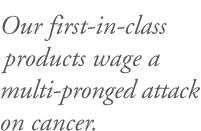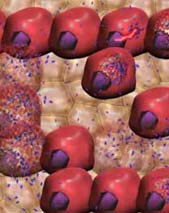JX-594
JX-594 is a proprietary, engineered oncolytic virus that is designed to selectively target and destroy cancer cells. JX-594 is designed to attack cancer through three diverse mechanisms of action: 1) the lysis of cancer cells through viral replication,
2) the reduction of the blood supply to tumors through vascular targeting and destruction, and 3) the stimulation of the body's immune response against cancer cells. JX-594 exploits a specific genetic feature in cancer cells to become activated and lyse the cells, including the EGFR-ras signaling pathway, the cell cycle activation and the loss of cellular interferon defenses. JX-594 is a Wyeth vaccinia virus with a disruption of the viral thymidine kinase (tk) gene and expression of the immunostimulatory cytokine, GM-CSF (granulocyte macrophage colony-stimulating factor).
Phase 1 and Phase 2 clinical trials in multiple cancer types have shown that JX-594, delivered either directly into tumors or intravenously, induces tumor shrinkage, necrosis and is well-tolerated by patients. Objective tumor response has been demonstrated in a variety of cancers including liver, colon, kidney, lung and melanoma. Importantly, JX-594 has also demonstrated an excellent tolerability profile to date in multiple clinical trials. Multiple JX-594-treated patients have survived for over one year and up to four years.
Interim results of a randomized Phase 2 clinical trial using intratumorally-administered JX-594 for the treatment of advanced hepatocellular carcinoma (HCC), or liver cancer, demonstrated increased survival for the full dose JX-594 treated group versus the low dose group (10% of full dose), at both six and 12 months. (See press release) Additionally, Jennerex presented positive clinical data from the company's Phase 1 dose escalation study evaluating the intravenous (IV) administration of JX-594 to patients with metastatic cancer. (See press release) This trial showed clear dose-related delivery to solid tumors, cancer-targeted replication and gene expression, and anti-cancer effects of JX-594 delivered IV.
A pilot trial evaluating JX-594 followed by sorafenib (Nexavar®) to treat liver cancer patients is being conducted, and strong interim data were presented showing tumor responses and a positive trend toward prolonged survival when compared with historical controls. We expect to present full results from these two trials next year. A larger randomized clinical trial of JX-594 in liver cancer patients is planned to start in 2011.
Transgene (NYSE Euronext Paris: FR0005175080), a bio-pharmaceutical company specialized in the development of immunotherapeutic products, holds an exclusive license to develop and commercialize JX-594 in Europe and neighboring countries. Other regional licenses are held by Lee's Pharmaceutical Ltd. for China and Green Cross Corporation for South Korea. Jennerex has not licensed rights in the United States or Japan.



